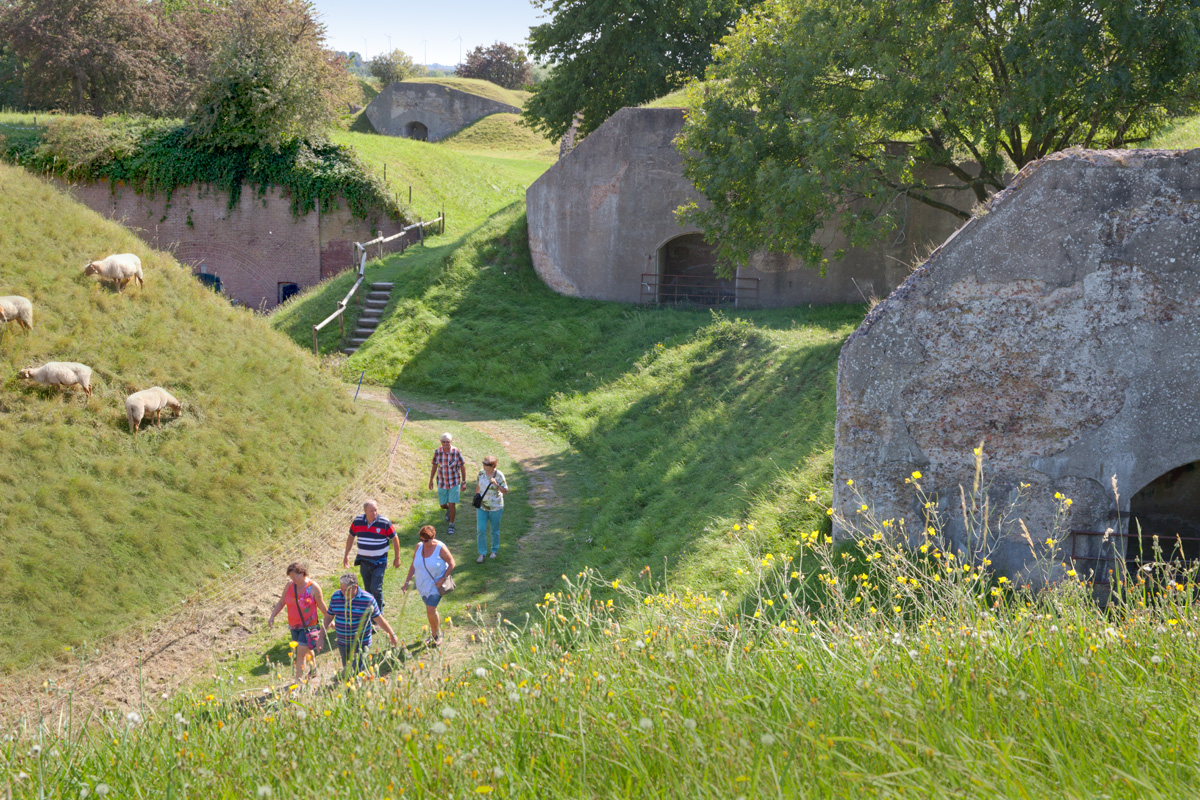Imagination of the Zuiderwaterlinie
The Zuiderwaterlinie (Southern Water Line) is one of the oldest and longest water defence lines in The Netherlands. The line connects Bergen op Zoom to Grave. The line has a long history with specific stories of war and peace from the past until now. In the past academic year, students made plans to develop this military heritage for the future. The purpose of the student plans is to show what possibilities the Zuiderwaterlinie offers for the future of Noord-Brabant.
Students visualise the future
In a number of workshops or student hubs, students of Landscape Architecture, Heritage Studies (VU Amsterdam) and Applied Archaeology (Leiden University) worked on behalf of the Zuiderwaterlinie project office and Staatsbosbeheer (the Dutch Forestry Commission). TU Delft students from the Landscape Architecture Master's track participated in this project in September 2020. Currently, the plans are being compiled for publication in a national magazine. The ultimate goal is to inspire administrators and officials to give the heritage of the Zuiderwaterlinie a central place in spatial developments concerning climate change, water management, energy generation, increased tourism, etc. Therefore the Zuiderwaterlinie will not be a landscape just to be preserved, but above all to be developed, with the heritage connecting the residents and tourists with their surroundings.
Artworks presented during Landscape Triennial 2021
On Tuesday 20 April, ten artists will present their future perspectives on the Zuiderwaterlinie, based on the plans that students of the five Dutch landscape architecture programmes (DSL) have developed over the past year in collaboration with the LDE Center for Global Heritage & Development. These works of art will be exhibited on the ramparts of Heusden. All is part of Landscape Triennial 2021. The triennial is a national event about, for and with the Dutch landscape. The aim of the student plans and land art is to inspire local residents and administrators to use the full possibilities the Zuiderwaterlinie has to offer for the future of North Brabant.
Workshops LDE Center for Global heritage & Development
Assistant Professor of Landscape Architecture Gerdy Verschuure-Stuip supervised and organised these workshops for local partners, owners or municipalities previously. Within the BK master track Landscape Architecture, students have participated in these workshops every year for the past 10 years. This is a lustrum activity for the ten year anniversary of the track. The aim of these workshops, in which students created innovative images of the future in just a few days, was to give a new impetus to stagnant processes. Despite the hard work, almost all participants find these meetings enormously inspiring. The new ideas provide a positive impulse to local spatial discussions about heritage. In the past few years, the attention for participation of local residents has grown and this requires adjustments in the set-up of a workshop. "In recent years, for example, we have been working together with heritage schools in Amsterdam and Leiden and with landscape architecture students from Wageningen. Currently, these workshops are part of the student hubs of the LDE Center for Global Heritage & Development. With a large group of students we cross the country for new assignments. It is also great fun for the teachers to be involved in these processes," says Gerdy Verschuure-Stuip.
Educational research
Currently, the cooperation between practice and design education in the field of heritage is growing. Gerdy: "In consultation with practice, we see that where the emphasis used to be on presenting innovative ideas, we also see more and more questions about how to include civic engagement and participation in these developments." Therefore, parallel to these workshops, educational research has also been started through SIA Regio organ City Deal Knowledge Creation. This project works together with the municipality Breda. Therefore, on 20 April, a webinar on this topic will discuss how these participatory processes can be set up even better with stakeholders from the Rijksdienst voor Cultureel Erfgoed (Cultural Heritage Agency), the Planbureau voor de Leefomgeving (PBL Netherlands Environmental Assessment Agency) and the universities of Wageningen and Delft.
More information
- The workshops are part of the student hubs of the LDE Center for Global heritage and Development.
- The students' plans can be viewed on the website of the Zuiderwaterlinie project office.
- This project is part of the Living lab Zuiderwaterlinie at the Landscape Triennal.
- The research for the student workshops is called Nieuwe Stellingnames and is financed by SIA Regieorgaan.
- Contact Gerdy Verschuure - Stuip for more information.

